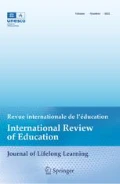Abstract
The premise being that there is a significant correlation between communication in the classroom and the academic performance of students, this article approaches the learning process as itself a function of communication, whereby communication is understood as a two-way interactive process. This is not to say that learning is communicatiion, nor is it to say that academic performance exists in a simple causal relationship to successful classroom communication: Successful communication between the teacher and students is a necessary condition of academic achievement. Effective teaching presupposes effective communication. The teacher makes effective communication possible by identifying the needs of the students, addressing these needs at the appropriate level, and creating a relaxed atmosphere in which a free, democratic flow of discussion is possible. Active classroom participation is not in itself sufficient, however; the cognitive processes must be brought into play. If the needs of the students have been accurately identified, and if appropriate verbal and non-verbal communication is employed, the chances of success are correspondingly high.
Effective teacher ccmmunication can be learned, and it is the responsibility of teacher training institutions and supervisory bodies, as well as of the teachers themselves, to ensure an adequate awareness of modern communication theories.
Zusammenfassung
Ausgehend von der Prämisse, daß eine wichtige Korrelation zwischen Kommunikation im Klassenzimmer und der formalen schulischen Leistung von Schülern besteht, wird der Lernprozeß in diesem Artikel als eine Funktion der Kommunikation verstanden, wobei Kommunikation als ein wechselseitiger, interaktiver Prozeß angesehen wird. Das heißt nicht, daß Lernen Kommunikation sei oder daß formale schulische Leistung in einem einfachen, kausalen Verhältnis zur erfolgreichen Klassenzimmerkommunikation steht. Erfolgreiche Kommunikation zwischen Lehrer und Schülern ist eine unerläßliche Voraussetzung für die schulische Leistung. Wirksamer Unterricht setzt eine wirksame Kommunikation voraus. Der Lehrer macht die wirksame Kommunikation möglich, indem er die Bedürfnisse der Schüler feststellt, sie auf der angemessenen Ebene zur Sprache bringt und eine entspannte Atmosphäre schafft, in der ein freier, demokratischer Kommunikationsablauf möglich ist. Aktive Klassenraumbeteiligung allein ist jedoch nicht ausreichend: der kognitive Prozeß muß mit einbezogen werden. Wenn die Bedürfnisse der Schüler genau festgestellt worden sind und wenn die adequate verbale und nonverbale Kommunikation stattfindet, sind die Erfolgsaussichten dementsprechend hoch.
Wirksames Lehrerverhalten kann gelernt werden und es gehört zu den Aufgaben der Lehrerbildungseinrichtungen, der Aufsichtsbehörden und der Lehrer selbst, ein angemessenes Verständnis von modernen Kommunikationstheorien zu vermitteln.
Résumé
En partant de l'hypothèse qu'il existe une corrélation significative entre la communication à l'intérieur de la classe et les performances académiques de l'apprenant, cet article considère le processus d'apprentissage lui-même comme une fonction de communication, entendue comme un processus interactif à deux sens. Il ne s'agit pas de dire que l'apprentissage est communication, ni que la performance académique existe dans une simple relation causale avec une bonne communication à l'intérieur de la classe: Réussir à établir une bonne communication entre l'enseignant et l'apprenant est une condition nécessaire à une bonne performance académique. Tout enseignement efficace suppose une communication efficace. L'enseignant-facilitateur rend une communication efficace, en identifiant les besoins des apprenants, en y apportant des solutions au niveau approprié et en créant une atmosphère détendue failitant le déroulement libre et démocratique des discussions. Une participation active à l'apprentissage n'est pas une condition suffisante en soi, car les processus cognitifs doivent entrer en ligne. Une fois les besoins des apprents correctement dépistés et servis, et une bonne communication verbale aussi bien que non-verbale établie, les chances de succès sont accrues en conséquence.
Savoir communiquer de manière effective peut être appris par l'enseignant, et il appartient aux institutions de formation des enseignants, au corps des superviseurs ainsi qu'aux enseignants eux-mêmes de se tenir informés et de tirer avantage des théories modernes de communication.
Similar content being viewed by others
References
Asante, S.A. “The Relationship between Communication and Student Performance in Secondary Schools in Rural Ghana and Mexico’. Unpublished study conducted for Unesco, 1973, p. 18.
Ekuban, E.E. ‘Effective Communication and Institutional Management’. Paper presented at a conference for school principals and zonal supervisors in the Cross River State, Nigeria, 1980, p. 18.
Essien, I. M. ‘The Learning Process’. Unpublished paper, Department of Education, University of Calabar, 1978, p. 10.
Eteng, E.U. ‘Effective Communication as a Tool of Public Relations’.The Business Educator (Enugu Department of Business Education, University of Nigeria). (1979), January, pp. 17–18.
Fielder, K. ‘The Development and Validation of an Observational Measure of Classroom Influence’.Dissertation Abstracts International. 35 (1974), No. 4.
Gage and Berliner.Educational Psychology. Chicago: McNally College Publishing Company, 1975, pp. 102–103.
Harlow, E.Practical Communication. London: Longman Ltd., 1976, p. 3.
Korth, W. and Cornbleth, C. ‘Teacher Perception and Teacher-Student Interaction in Integrated Classrooms’.Journal of Experimental Education. 48 (1980), No. 4, pp. 259–263.
Levine, E. ‘Let's Talk: Breaking Down Barriers to Effective Communication’.The Journal of Supervisory Management. 25 (1980) No. 6, pp. 1–12.
Mbiti, D.M.Foundations of School Administration. Nairobi: Oxford University Press, 1974, p. 31.
Miller, P.W. ‘Non-Verbal Communication: How to Say What You Mean and Know What They Are Saying’.Journal of Engineering Education. 71 (1980), No. 2.
Ndongko, T.M. ‘Communication and the Learning Process’. Unpublished paper, Department of Education, University of Calabar, 1980, p. 8.
Rosenshine, Barak. ‘Teaching Behaviours Related to Pupil Achievement: A Review of Research’. In Westbury, I. and Bellack, A. A.Research into Classroom Processes: Recent Developments and Next Steps. New York, 1971, pp. 51–52.
Smith, L.R.,et al. ‘Effect of Lesson Vagueness and Discontinuity on Student Achievement and Attitudes’.Journal of Educational Psychology. 72 (1980), No. 5, pp. 670–675.
Rights and permissions
About this article
Cite this article
Ndongko, T.M., Agu, A.A. The impact of communication on the learning process: A study of secondary schools in Calabar municipality, cross river state of Nigeria. Int Rev Educ 31, 205–221 (1985). https://doi.org/10.1007/BF02262577
Issue Date:
DOI: https://doi.org/10.1007/BF02262577




